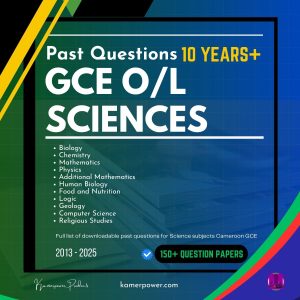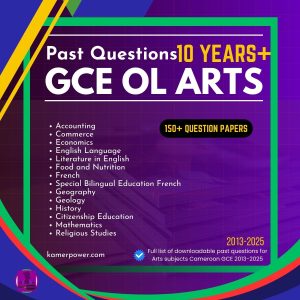O Level 590 Logic syllabus Cameroon GCE Board
Contents
Cameroon GCE Board O Level Logic syllabus
590 LOGIC
Kamerpower team always have its viewers best interest at heart, so we always make sure we bring to your door step any article that will be of help to you all, especially as all GCE candidates preparing for their registered subjects this year. Cameroon GCE Board O Level Logic syllabus.
-
INTRODUCTION
Ordinary Level Logic is designed to train the students in certain fundamental concepts and processes in which the power and applications of logic are emphasized through an introductory study of both traditional and modern Logic. It is also an indispensable tool for reasoning in all academic disciplines and day-to-day living. As such, it serves as a prerequisite for Advanced Level Philosophy.
2. AIMS
The Aims of teaching Logic at the Ordinary Level are to
- Develop in the learners the necessary tools and techniques of acquiring and developing critical thinking skills.
- Introduce learners to the knowledge and understanding of some central concepts and procedures in Logic.
- Enable the learners to acquire the ability to organize coherent explanations and arguments.
- Introduce learners to the knowledge of, and the ability to identify fallacious reasoning.
- Enable the learners to improve on the correct and effective use of language.
- Introduce the learners to the basic rudiments of Symbolic Logic.
3. GENERAL OBJECTIVES
Learners should be able to:
- Understand the central concepts and procedures of Logic and use them in problem-solving and in formulating questions.
- Draw adequate conclusions from observations or given assertions.
- Think coherently, illustrate arguments and explain them adequately.
- Detect errors of thought and be able to correct and avoid making them.
- Use language adequately for effective day-to-day communication.
- Understand the role of Symbolic Logic and its applications.
4.ASSESSMENT OBJECTIVES
The study of Logic at the Ordinary level shall permit the candidates to be able to:
- Recall basic concepts and apply basic principles to specific situations: Ethics, Environment, Economy, Religion, Culture, Management, Jurisprudence, etc.
- Construct coherent arguments and engage in problem-solving.
- Construct and communicate ideas and thought concisely, clearly and coherently.
- Identify and correct errors in reasoning.
- Use and apply signs and symbols to daily-life situations.
| Assessment Objectives | Weighting |
| Knowledge | 35 % |
| Understanding | 35 % |
| Application | 25 % |
| Higher Level Abilities | 5 % |
4. THE EXAMINATION
The examination will consist of two papers
PAPER 1 MCQ’s
It will consist of fifty (50) questions, which cover the whole syllabus. Candidates are expected to attempt all the questions. This paper will last for one and a half hours. Each question carries one (1) mark.
PAPER 2 Structural / Problem-Solving Questions
This paper which will last for two and a half hours, shall consist of two sections:
Section A: Structural Questions and Section B: Problem-Solving Questions.
There will be a total of EIGHT (8) questions, designed to test the candidates’ skills in comprehension, interpretation, explanation and elementary analysis.
FOUR questions will be set on Section A, and FOUR questions on Section B.
Candidates will be required to answer FIVE questions, choosing at least two questions from each section. Each question carries 20 marks.
| Paper | Mode of Assessment | Weighting | No. of Questions | Duration |
| 1 | MCQ’s | 40 % | 50 | 1 ½ hours |
| 2 | Structural/Problem-Solving Questions | 60 % | 8 | 2 ½ hours |
6. THE SYLLABUS CONTENT
1.1 INTRODUCTION TO LOGIC
1.1.1 Nature of Logic
1.1.2 Purpose of Logic
1.1.3 Basic concepts of Logic
1.1.4 Types of Reasoning
1.1.5 Laws of Thought
1.1.6 Operations of the Mind
1.1.7 Logic and Related Fields
1.2 TERMS
1.2.1 Definition of a Term
1.2.2 Classification of Terms
1.2.3 Significance of Terms
1.2.4 Meanings of Terms
1.3 PROPOSITIONS
1.3.1 Definition of a Proposition
1.3.2 Types of Propositions
1.3.3 Types of Categorical Propositions
1.3.4 Translating Propositions into Standard Form
1.3.5 Distribution of Terms in Categorical Propositions
1.3.6 Symbolizing Propositions and the Venn Diagram Representation
1.4 LANGUAGE
1.4.1 The Uses of Language
1.4.1.1 The Basic Functions of Language
1.4.1.2 Kinds of Meaning
1.4.1.3 Forms of Discourse
1.4.1.4 Language and Thought
1.5 DEFINITION AND LOGICAL DIVISION
1.5.1 Definition of Definition
1.5.2 Purpose of Definition
1.5.3 Kinds of Definition
1.5.4 Rules of Definition
1.5.5 Limitations of Definitions
1.5.6 Definition of Logical Division
1.6 IMMEDIATE INFERENCE
1.5.1 Definition of Immediate Inference
1.5.2 Forms of Immediate Inference.
1.5.2.1 Opposition
1.5.2.2 Education.
1.7 MEDIATE INFERENCE
1.6.1 Definition of Syllogism
1.6.2 The Value of the Syllogism
1.6.3 The Structure of the Syllogism
1.6.4 The General Rules of the Syllogism
1.6.5 The Figures and Moods of the Syllogism
1.6.6 Translating Categorical Arguments into Valid Standard-Forms.
1.6.7 Testing the Validity of the Syllogism by the Venn Diagram Technique.
1.8 OTHER TYPES OF ARGUMENTS
1.7.1 The Enthymeme
1.7.2 The Sorites
1.7.3 The Hypothetical Syllogism
1.7.4 The Disjunctive Syllogism.
1.7.5 The Dilemma
1.9 FALLACIES
1.8.1 Definition of Fallacies
1.8.2 Significance of Fallacies
1.8.3 Types of Informal Fallacies
1.8.3.1 Fallacies of Relevance
1.8.3.2 Fallacies of Ambiguity
1.10 INTRODUCTION TO SYMBOLIC LOGIC
1.9.1 Definition of Symbolic Logic
1.9.2 Logical Connectives.
1.9.3 Basic Truth Tables and their Uses.
7. SELECTED SYMBOLS IN USE
Negation (~)
Conjunction (.)
Disjunction or Alternation (v).
Material Implication
Bi-Conditional or Equivalence.
TEXTBOOKS
1. Copi, M. I. and Cohen (1999): Introduction to Logic, Macmillan Co. Inc., N.Y.
2. Layman C. Stephen (2005): The Power of Logic, McGraw Hill Higher Education, N.Y.
3. Moore Brooke Noel and Parker Richard (2000): Critical Thinking, McGraw Hill
Higher Education, N.Y.
Recommendation
- Cameroon GCE Board A Level Philosophy syllabus
- Cameroon GCE board O Level Additional Mathematics syllabus
- Cameroon GCE board syllabus O Level Geography
- Cameroon GCE board O Level Mathematics syllabus
- Cameroon GCE A Level Physics syllabus
Cameroon GCE Board O Level Logic syllabus
Related Study Materials:
-
Sale!

Download O/Level Science Past Question Papers GCE 2010-2025
Original price was: 14500 CFA.11500 CFACurrent price is: 11500 CFA. Add to cart -
Sale!

GCE AL Arts Subjects Past Questions 2013-2025 Cameroon
Original price was: 15000 CFA.12000 CFACurrent price is: 12000 CFA. Add to cart -
Sale!

Ordinary Level Arts Past Question Papers Cameroon GCE 2010-2025
Original price was: 14500 CFA.11500 CFACurrent price is: 11500 CFA. Add to cart



Good evening, please can I have the Gce syllabus?
Please,could you help me with: Economics,commerce and logic scheme of work for 2024/2025?